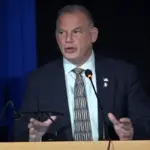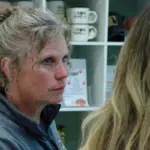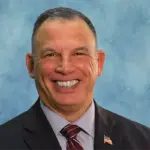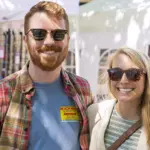Courageous Conversations
by Linda L. Esterson, photography by Nikola Tzenov
Braver Angels Helps Voters Find Common Ground
The 2023 American Trends Panel’s annual survey concluded that American voters are roughly evenly split between political parties. Even with differing viewpoints, people are voicing their opinions and arguing, often strongly enough to fracture friendships and relationships among family members. With this year’s presidential election only months away, tempers are flaring more than ever.
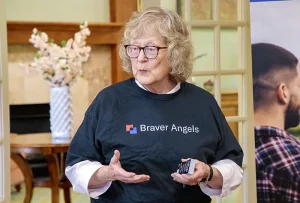
The Central Maryland Braver Angels, a volunteer organization based in Westminster, aims to unite individuals with differing views and encourage them to disagree constructively. According to Jordan Haegerich, co-leader of the organization, this dialogue is good for the country.
“We’re seeing more and more people who might have a blow-up argument, and then they don’t speak to each other for 15 years,” Haegerich says. “That’s what we think is the danger about it.” Haegerich recalls a significant partisan divide during the 2016 presidential election when former President Donald Trump emerged victorious. Many people posted on Facebook that if a friend voted for Trump, they should “unfriend” them.
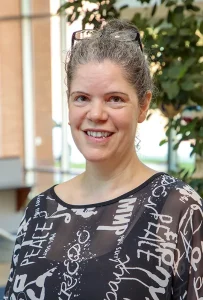
According to Sarah Star, an assistant professor of arts and humanities at Carroll Community College, dividedness is a failure of the two-party system in the United States.
“As a form of government, democracies depend on citizens being willing to invest in one another in the belief that, at the end of the day, we all do better when we work together,” says Star, who runs a Democracy Lab at the college. “This is what makes the divisiveness we’re currently experiencing in our country so poisonous. Regardless of which party you align with, in many cases, we’re being encouraged not simply to disagree but to fear or even hate those ‘on the other side.’ It’s hard to see how a strong, successful society can be grown from such foundations.”
Cindy Hirshberg, who co-leads Braver Angels locally with Haegerich, experienced a similar situation, which led to her involvement in the organization.
“The country was coming out of the isolation of COVID-19, and I was experiencing a disruption in a really important set of friendships. We had been buddies for 30 years — 30 years — and suddenly, we couldn’t talk to each other anymore,” she recalls. “It was painful. It took a piece of my heart, and it took a piece of my social life, too.
“I was very much in favor of anything available that would not let personal and family relationships bear the brunt of the political rhetoric that was flying around at that time,” she says.
Hirshberg attended a Braver Angels event that encouraged people to meet with others who were not like-minded and enabled a spirited exchange of views. Participating in this event motivated her to get involved.
Part of A National Movement
Braver Angels began in New York as Better Angels to get people together to start talking following the 2016 presidential election. “We were so fraught with polarization and divisiveness, and Americans were just attacking other Americans verbally and sometimes in other ways as well,” Haegerich says.
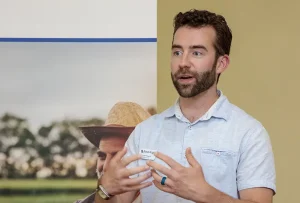
The organization renamed itself Braver Angels after research revealed that another group held a trademark on the name. The founders developed a workshop for bravery called the Red/Blue Workshop, uniting the red (Republican) and blue (Democratic) sides. This full-day intensive program brings citizens from both political sides together for moderated activities and structured discussions.
“The idea was that it takes a lot of courage to have these conversations, to talk to somebody that you disagree with and to withstand hearing an argument that you disagree with,” Haegerich says. “To give your point of view in a respectful way, it takes a lot of courage to do that.”
The Carroll County branch began in 2020, but the COVID-19 pandemic stifled it. Haegerich attended a virtual event in 2021, but the organization folded soon after. Realizing the urgency, Haegerich held an informational event at Carroll Lutheran Village, where he works as a resident life coordinator. Hirshberg, a resident there, was in attendance.
While they represented differing sides, the two banded together to revive the Carroll County Braver Angels. The first community event occurred at Hirshberg’s church, Cedarhurst Unitarian Universalists in Finksburg, in 2022. At that event, Hirshberg asked those in attendance to raise their hands if they had a relationship disrupted due to differing political views, and every hand went up. The response floored her.
Creative Programs
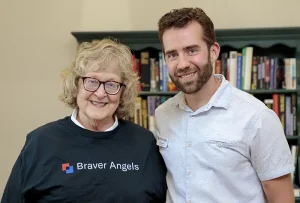
Braver Angels aims to reduce stereotyped thinking, clarify disagreements, build relationships and find common ground through listening and learning rather than declaring and debating.
The group holds information sessions around the community at local libraries, the Community Media Center, churches, schools and other locations to bridge the divide through structured conversations. It also holds regular debates, which a moderator runs. Up to eight individuals are selected to speak for four minutes. In the past, debates have covered topics such as immigration and education.
The annual “Walk a Mile in My News” also pairs people with altering views and encourages them to work together to learn about news sources that one another follows. The pair meets a few times, and two weeks later, the larger group reconvenes to share their acquired knowledge.
A Local Force
The Braver Angels aims to “bring Americans together to bridge the divide and strengthen our democratic republic.” Local leaders undergo training to present national programs and have leeway to modify them as needed. The Central Maryland Braver Angels takes the official mantra further; they align with their tagline “facilitating conversations to bridge the divide.”
Demand for programs and informational events has grown since the revival. Attendees have come from Rockville, Maryland, and Winchester, Virginia. While there are other groups in Anne Arundel and Montgomery counties, they aren’t as active, Haegerich notes. The group adopted the Central Maryland name in April with strong interest from individuals in Frederick and Howard counties.
Today, with a mailing list of about 200 and a growing member roll, Haegerich and Hirshberg are pleased with the progress. The organization meets on the second Sunday of each month, and each gathering includes an open discussion dedicated to a different topic. Participants select the next month’s topic. Recent meetings have covered books in schools, border security, election confidence and economic equality.
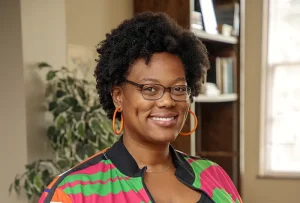
at bay.” – ERIN WATLEY
“I think they have a good model for doing things in a way that’s ‘civil’ or ways that don’t create arguments and lashing out,” says Erin Watley, associate professor of communication and cinema at McDaniel College. Watley teaches a course called “Difficult Conversations.”
“They do a good job of establishing their ground rules and the intention of how people talk to each other. I’m of the school of thought that groups are people knowing each other and learning about each other. It requires disagreement and conflict…. Their structure keeps the nasty parts at bay.”
Watley agrees that there can be disagreement even among like-leaning people, but enabling them to voice their opinions in mixed groups fully gives everyone a chance to share perspectives.
“A benefit [also] is hearing from people in real-time. It’s not a sound bite. It’s not just reading an article pushed to you because of an algorithm. It’s hearing real people. I think that’s one thing that gets lost in our current environment — taking time to engage with real people.”
A Necessary Endeavor
Haegerich grew up in an active political family that sported yard signs and bumper stickers at election time. Politics was about public service and instituting ideas brought forth by citizens to help the community.
“People in my particular generation remember when politics was not a toxic pursuit,” Hirshberg adds. “It was what you talked about in the supermarket checkout line.”
Politics is more complicated today, and disagreements are more passionate and hurtful.
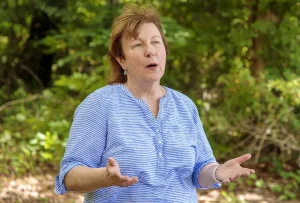
“[It] has been said that if you’re not arguing your point and trying to win, you’re not being a good soldier for your cause,” Haegerich says. “Whereas I think we’re turning off the critical thinking element of our minds and starting to become less human because of that. I think that’s where we’re seeing the fracturing of relationships.”
Patty Haney of Urbana considers herself an independent. She has views that are considered red and views considered blue. Haney finds it detrimental for people to be required to choose one or the other.
“I got involved because I was concerned about Americans who stopped talking to each other because, clearly, the power comes from input from both sides,” she says. “When you don’t see that back and forth happening, and that compromise between what would be considered more conservative and what would be considered more liberal, I just think it’s detrimental for all of us.”
Haney found it uplifting to witness conversations and dialogue with explanations about opposing views. That experience led her to volunteer and arrange workshops for the organization.
“I think it’s important that people remember that we have more in common than we think. Even if we don’t have things in common, if we can understand where somebody comes from with their perspective, it tamps down feelings of angst or anger,” she says. “I might not agree with that at all. But I can see how you feel the way you do. I don’t agree with you, but I don’t think you’re a bad person. To me, that’s just so important.”








